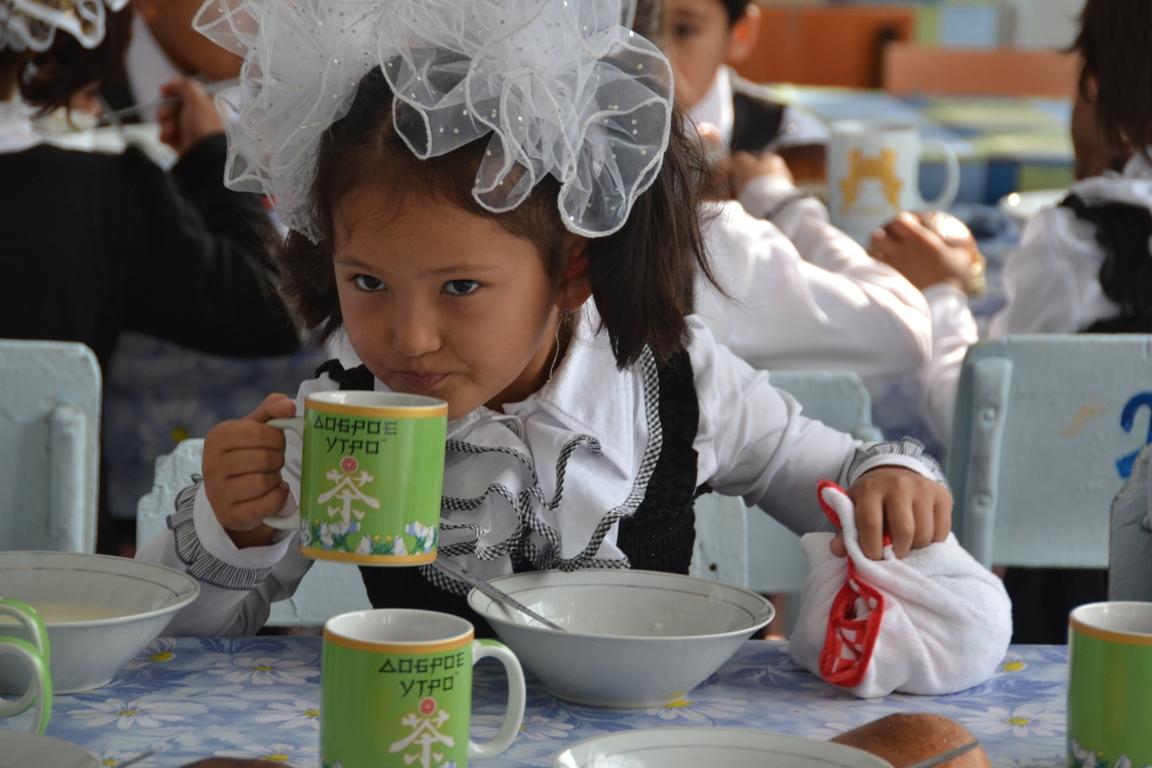The «Initiative of Roza Otunbayeva» International Public Foundation: «Providing opportunities for schools to improve the quality of school meals»
February 25, 2016, 06:00
In the Kyrgyz Republic, school lunches have received national support. Every year since 2006, the state budget allocated 7-10 som each day for the organization of school meals for each of the more than 350,000 students in grades 1-4. This equates to an average of more than 430 million som each year. Child nutrition mainly consists of a glass of milk or tea and a roll or other sweet pastry.
Currently, with financial and technical support of the World Food Programme and other international organizations, the Government and the Ministry of Education and Science of the Kyrgyz Republic implemented a school feeding program in the development of the CD 261 pilot schools as part of WFP's project "Optimizing national school meals in the Kyrgyz Republic." This program is aimed at creating conditions for improving the organization of supply of primary school students in the pilot schools of the Kyrgyz Republic in order to increase its effectiveness.
The "Initiative of Roza Otunbayeva" International Public Foundation promotes the UN World Food Programme in the Kyrgyz Republic in the implementation of this project, promoting the state policy in the area of school meals.
Curently, projects focusing on improving school meals which are run by the initiative of the Ministry of Education and Science of the Kyrgyz Republic, educational institutions, the parent associations, local authorities, as well as The "Initiative of Roza Otunbayeva" International Public Foundation have combined to reach over 800 schools, or one-third of all the schools in the Republic.
To support the project of the Kyrgyz Republic Government Order, № 734, dated December 26, 2014 was approved for the "Guidelines for the development of school meals in the Kyrgyz Republic." The following conditions are necessary for its successful implementation:
• The willingness of public authorities and the parent committees to support and improve the mechanisms for school meals;
• a base amount of funds allocated by the state for hot meals;
• availability of infrastructure in the dining rooms of typical buildings of most schools in the country;
• The experience of one-third of the schools serving hot meals;
• financial and technical capabilities for equipment in school lunch rooms, provided by WFP project " Optimizing national school meals in the Kyrgyz Republic";
• normative principle of budgetary financing, which allows 85% of effective schools to have their own accountants, cooks and kitchen staff by the total payroll.
Currently, the district education departments (RBB) have committed themselves to conduct tenders for all schools in the district; however, it does not always take into account the real needs and requirements of schools themselves. This jeopardizes the selection of the most suitable and quality providers that meet all the requirements and parameters of the customer. In this case, the school is not able to choose its own customer and the RBB plays the role of the “intermediary.”
Often there is only one contract with one provider for the entire area for the service of several dozen schools. This provider does not always have the necessary resources for one-time delivery of food throughout the area. This creates the risk of untimely delivery of food to remote schools, and additionaly, delivery of the products is not the of the freshest or best quality.
In 2015, a study was conducted with the assistance of the consulting company “Social Consulting" to assess the current state of affairs on hot meals organization of children in schools, the extent of involvement of local authorities and parents, as well as international organizations, the presence of obstacles in the legal framework and administration of schools which was commissioned by The "Initiative of Roza Otunbayeva" Foundation within the UN WFP project.
According to the results obtained, the conclusion was that the the constraints and risks related to universal introduction of hot food in schools of the republic are the scope of state regulation, the availability of productive capacity, and administration and monitoring.
The barriers in the field of state regulation in the organization of hot meals is the lack of or inadequate legal and regulatory framework.
In this regard, The "Initiative of Roza Otunbayeva" IPF with technical support from WFP in coordination with the permission of MoES of the Kyrgyz Republic, will work with the involvement of the partner organization “Social Consulting” in 2016 with the aim of improving the national school feeding program, as well as strengthening the capacity of the initially involved pilot schools, and then spread to the whole country. The pilot project includes 114 public schools in Issyk-Kul Oblast, Jeti-Oguz Rayon, Naryn Oblast, At-Bashy Rayon, and Osh Oblast, Kara-Kulja Rayon.
The pilot project will:
- Help to strengthen national capacity to improve the quality, effectiveness and sustainability of mechanisms for raising funds (in addition to the public) for the needs of school meals and procurement;
- Conduct revision of the legal framework and the development of mechanisms for the institutionalization of contributions and procurement for the organization of hot meals for children in schools;
- Test the proposed mechanisms of institutionalization of contributions for hot meals for children, as well as the procedure for organizing the procurement, expenditure and accounting of budgetary and extra-budgetary funds (parental contributions, contributions to business structures, incomes from agriculture dedicated to schools, contributions by JOBO, etc.).